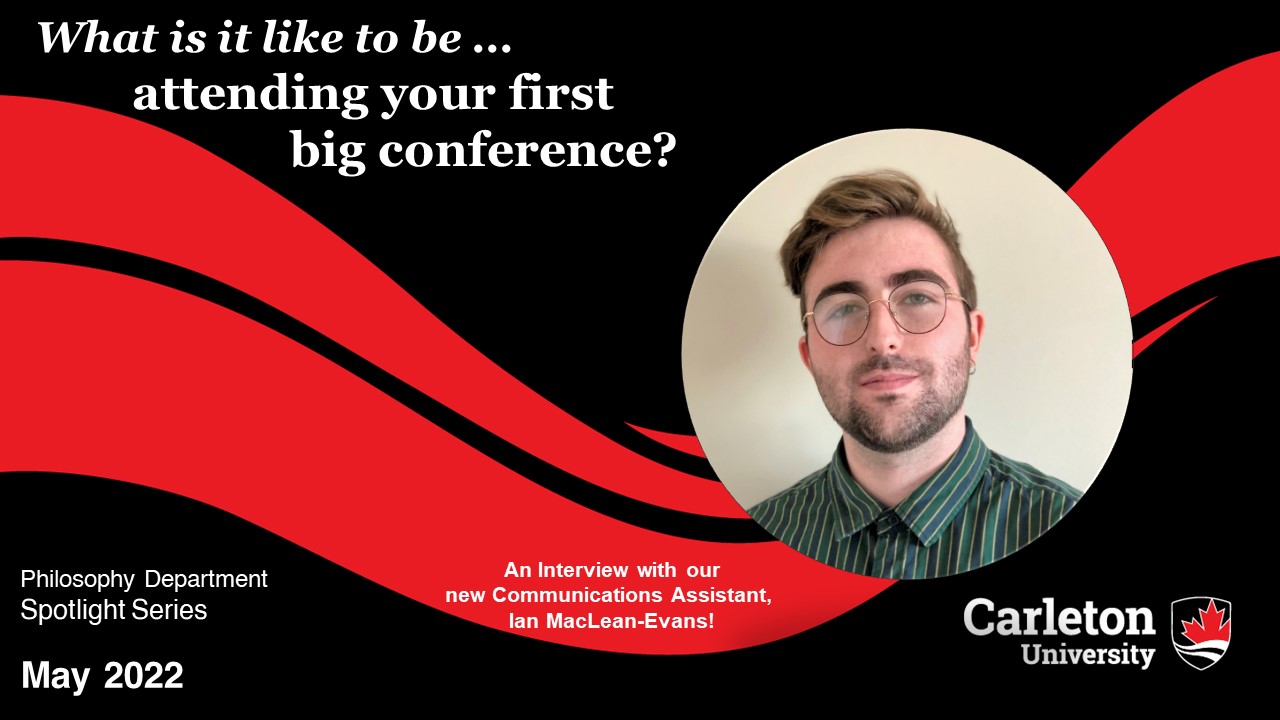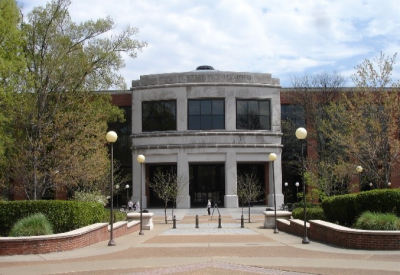What is it Like to be Attending Your First Big Conference? An Interview with M.A. Student Ian MacLean-Evans

Meet Ian MacLean-Evans, second year M.A. Philosophy student and the department’s new Communications Assistant!
We wanted to take this opportunity to introduce Ian and discuss his new role, his experience attending his first major in-person academic conference, and what his plans are post-graduation.
Professor Kyla Bruff: Ian, you recently joined our Department’s Communications Team. How has it been to work closely with different members of our philosophy community and to play such an important role in highlighting the Department’s successes?
Ian MacLean-Evans: It’s been a lot of fun! For one, I’ve really enjoyed having the chance to interact more with the members of the Communications Team, all of whom have been very kind. For another, it’s been very cool to learn about all the interesting things that our students and faculty have been doing; members of the Carleton philosophy community have a lot more going on than we might realize. I never knew there was so much done, and I really want to share the department’s accomplishments with the public and give people their well-deserved applause.
KB: You recently presented at your first major in-person philosophy conference at the University of Memphis. Congratulations! What was the topic of your presentation? Did the development of this presentation complement your MA thesis research?
IME: My presentation, “Spinoza and Self-Destruction: Oppression and Suicide,” was an extremely compact version of my M.A. thesis. My thesis is on Spinoza’s philosophy of suicide, and on how it could potentially be useful for motivating more morally responsible contemporary suicide research.
Presenting at the conference allowed me to see how some aspects of the project may need further refinement or comment. It was a little too close to when I had to submit for me to change much in the actual thesis, but I have a chapter from the thesis under review at a journal and the comments from the conference certainly made me think about the kinds of revisions I should include before resubmitting to the second round of review!
KB: How did you prepare for your presentation before you left? Did you receive some tips and feedback from your supervisors, Professor Melissa Frankel and Professor Christine Koggel?
IME: I owe a lot to both Prof. Frankel and Prof. Koggel in terms of conference prep. Since my presentation was just a compact version of my thesis, the supervision that both of them have offered me was crucial in the development of my research. Also, their comments on my abstract submission for the conference were no doubt helpful in my getting into the conference.
Both also helped a lot on the more practical level. Prof. Koggel was very helpful in my getting resources to help pay for travel to Memphis. Prof. Frankel also answered my questions very reassuringly on conference etiquette (how formally to dress, whether one should go to every talk, etc…) and encouraged me to socialize with the other conferees. They both helped make my conference experience as stress-free and as enjoyable as possible!
KB: The conference theme was Early Modern Social Justice. Did hearing papers on other social justice topics help you contextualize your work in relation to social justice issues and bring out new social implications of your research?
IME: Yes, however the theme meant that the kind of comments I got were varied: about half the attendees were more focused on early modern history of philosophy, and the other half were more focused on contemporary social justice (though both groups were interested in the other). The former group posed questions about my Spinoza exegesis, and the latter about the contemporary aspects of my research. In both cases, I was given vital feedback on where my research could go in the future and where it could be strengthened.
KB: I saw that there were some world-renowned academics at the conference! Were you starstruck by any of the presenters? Could you please tell us a little bit about your interactions with the senior scholars at the conference—what did you gain by speaking with them one-on-one and were you nervous?
IME: Oh absolutely, I was very starstruck! Without naming names, one of the most respected Spinoza scholars on the planet was there, as well as one of the most well-known contemporary social philosophers. At first, I was worried that I would say something that would totally embarrass myself, or that my talk would seem absurdly immature or unsophisticated to such accomplished scholars!
However, my fears were mostly unfounded. Having the chance to talk with these big-name senior scholars was very encouraging, in that they were very kind and very sociable, and interested in my research. By speaking with them, I saw that they were interested researchers like myself, rather than rockstars, and I also was encouraged by their interest. If these big names thought my work was at least interesting, then my work can’t be that disastrous!
KB: What about the other graduate students at the conference? What was it like to exchange ideas with them?

IME: There was only one other graduate student chosen to speak at the conference, from Baylor, but a number of the University of Memphis grad students came to see the talks. They were all very friendly and encouraging, and in many ways were those with whom I related the most (which makes sense!). We also discussed and sympathized about professional things relating to grad student life, like (terrifying) job market prospects, our dependency on grant money, and so on, and it really cultivated a feeling of solidarity.
On a more philosophical note, I suppose, myself and the other grad student speaker spent a lot of the conference together, and I learned a lot about Kant from him. It was very cool to see what other philosophy graduate students are working on, and to talk about philosophy with someone in a similar career stage as myself, who had all sorts of exciting new directions in which to take his research.
KB: Do you have any advice for graduate students who might be worried about responding to questions after their first conference presentations?
IME: To other grad students, I would say: If you can quickly think of a response to questions after your talk, it’s probably because you know something which helps you give a good response! And, if you don’t have a response, that’s fine too. Many senior scholars will respond to questions after their own talk by saying that they don’t have a response at the moment, so if they can admit ignorance, why not us, who have spent even less time researching our areas of philosophy?
KB: If accepted to an academic conference, do you have any tips on how a student in philosophy at Carleton could go about seeking financial support to present their work?
IME: I managed to secure travel funding through Carleton’s FGPA. It was fairly straightforward. I just contacted my department’s grad program administrator (the excellent and caring Lauren Wells-McGregor!) and got the help needed from her and my supervisors to apply. Make sure, though, to apply well in advance! I applied a bit more than a month ahead of my trip, and managed to get my travel bursary before even leaving for the conference. I also had to submit a proof of attendance after the conference ended, so don’t forget about that part! Details on applying for the travel bursary for those interested can be found here.
KB: Between the recent submission of your thesis, your presentation at this conference, and finishing your TA work, you have had a very busy and successful final year of your MA program. Could you please share some of the time management and organization strategies you have used and indicate some sources of motivation that have helped you to succeed this year?
IME: I must admit, my time management is quite, well, unmanaged… I just wake up and make myself work on whatever seems most pressing that day, and I make sure I work on something as close as possible to everyday, even a little bit! This adds up over time to make it possible to get a lot done.
However, we can’t talk about grad student time-management without noting the financial precarity a lot of grad students face: if one has to work full-time in addition to their grad studies, then they’ll have less time to work on conference applications, journal submissions, and other things in addition to their thesis, dissertation, or class work. I am lucky to have received a very good grant during my degree, and to have found a place with cheap rent, so I can focus on my work. I guess the most realistic time-management strategy is to make more time in the long run by applying to as many funding opportunities as possible. But, the sad reality is that even winning these is, in many ways, a lottery, and making the best kind of grant application possible also requires time, which many grad students may already not have access to.
KB: Although we are, of course, thrilled for you, we will certainly miss you next year as you leave Carleton to pursue your PhD! How has the Philosophy Department at Carleton prepared you for your PhD studies?
IME: Carleton has, for me at least, been an absolutely fantastic place to learn about philosophy both as a field and as a profession. The faculty prides itself on close supervision and mentorship, and that pride is well-founded, at least in my own personal experience. My supervisors and some other faculty (especially Professors Annie Larivée, Dave Matheson, and Gordon Davis) were very encouraging, and they helped me with different projects I undertook, whether it was my TA work, RA work, grant applications, journal submissions, PhD applications, conference applications, or my actual M.A. thesis. Their feedback has stuck with me, and I feel more confident and prepared with regards to all of these things than I otherwise would had I not received such close mentorship at Carleton. In my personal experience, Carleton’s M.A. program really prepared me for what is to come in my future studies.
Thanks Ian for answering our questions! You can find more about Ian and his research on his website, and you can find him on Twitter, Philpeople, and LinkedIn. Keep an eye out for our next Spotlight in June 2022!
Have something to share with the Carleton Philosophy community? Fill out our news submission form.
